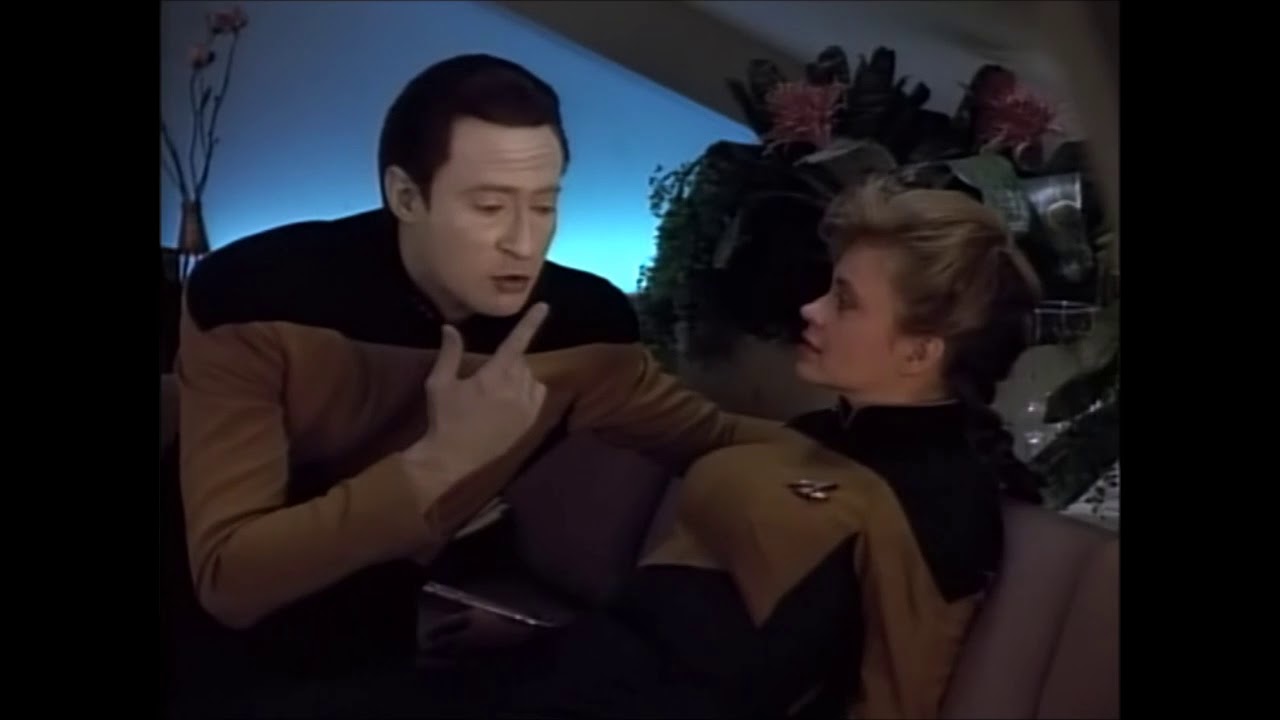|
home | what's new | other sites | contact | about |
||
|
Word Gems exploring self-realization, sacred personhood, and full humanity
Jenna and Data
Wikipedia: "In Theory" is the 25th episode of the fourth season [99th overall] of the American science fiction television series Star Trek: The Next Generation, originally aired on June 3, 1991, in broadcast syndication. The episode was written by Joe Menosky and Ronald D. Moore and was the directorial debut of cast member Patrick Stewart. Set in the 24th century, the series follows the adventures of the Starfleet crew of the Federation starship Enterprise-D. In this episode, [the android] Data (Brent Spiner) accepts the affections of shipmate Jenna D'Sora (Michele Scarabelli) and pursues a romantic relationship with her. However, Jenna soon comprehends the downside of a "programmed" relationship.
Kairissi. Each vignette of this “Perfect Mate” investigation offers a different perspective on romantic relationship. Elenchus. Some of it tells us what to do, and some of it the other. K. Did you like the story of Jenna and Data? E. Actually I did. Data is pure in motive, well meaning, and Jenna is a sweetheart, too. They acted in good-faith and tried to make this work. K. Let me ask a question that many readers will have: Since Data is an android and can’t fall in love, what’s this story really about, and why should we include it in the “Perfect Mate” anthology? E. Extreme examples which highlight certain principles can be very instructive to us. But let’s ease ourselves gradually into the case of Jenna and Data. What immediately strikes you about their situation, Kriss? K. Well, one thing – Jenna thought she might like or even love Data because of something that happened during their participation in a chamber-music concert.
K. After the performance, she confided in Data: “I wasn’t very good tonight. I was off-tempo and lagging a bit.” Data responded with, “I detected no anomalies. I think you did fine. The audience enjoyed it, too, and it all turned out well.” To this, Jenna remarked, “Thank you, you are so kind, Data.” E. I see two factors in play which began to influence Jenna. First, Data’s encouragement and positive words. We all seek for this and need the support of a good heart. K. It should be mentioned, too, that Jenna, just then, was particularly open to a gracious comment. She’d recently walked away from a boorish boy-friend and was feeling vulnerable. And Data seemed especially attractive “on the rebound.” E. Yes, we understand how that can happen. And there’s something else, too, that prompted Jenna toward love. The arts have a natural way of opening our spirits to the sublimity of relationship. Singers, writers, musicians, poets, painters, and other artists well know the power of the fine arts as inducement to giving oneself to romantic feelings. This is why there are jokes about “I met him at church-choir practice.” K. Yes, it's God's will, I'm sure. And when you meet someone in process of enjoying or participating in the arts, there’s a certain intoxication, a level of unreality, that might take one over, especially if one is young and inexperienced. And this dynamic of illusion was working on Jenna. E. What else did you notice about this episode of STNG? K. There were a lot of things that I thought were very funny, and we’ll talk about some of them, but a really funny thing is how Jenna was always on the verge of bursting out laughing. No matter what Data said, it always came out wrong, even though he meant well.
E. (softly laughing) As Guinan once said to Data as he was attempting to tell a joke, “You’re timing is off!” “There’s nothing wrong with my timing,” Data countered, “it’s digital.” K. (smiling) Now that is funny. But here’s an example from the episode of what I’m talking about. Jenna’s off work, in her apartment, and Data comes through the door and bellows, in a sing-song voice yet, “HONEY, I’M HOME!!” E. (laughing) K. And she’s hysterical now, but he’s quite serious, and thinks this is the way you’re supposed to act when you’re “in a love relationship.” E. (smiling) “Honey, I’m home!” Who made that famous? Was it Jackie Gleason or Ricki Ricardo around 1960 in the sit-coms of the day? K. I’m not sure right now, but, after Jenna stopped laughing, he explained that he’d researched the cultural norms, practices, and sayings of romance on hundreds of different worlds, and so he thought he was acting in an appropriate manner. E. (softly laughing) K. So, the next thing he tries is to impersonate – well, it’s hard to explain, but – some “grade-b movie” character who thinks he’s debonair and sophisticated and a charmer with the ladies. E. (laughing) K. Brent Spiner does such a good job with just the right curl of the lip and a hint of an eye-roll to effect the pseudo-savoir faire. And now Jenna is breaking up again. E. (laughing) K. And now Data sits her down and is going to wait on her hand-and-foot, portraying himself as a slave-to-love. He wants to massage her feet… E. (laughing)
K. And when none of this carnival effect produces the “romantic moment,” Data pulls a new technique out of his research memory-bank, and suddenly he’s actually shouting and accusing, to the effect…
"YOU WERE ALWAYS THAT WAY!" and "YOU LEAVE MY MOTHER OUT OF THIS!" - Jenna is shocked by this outburst and forcibly tells him, "You need to leave!" But then Data quietly explains, "Is this not a method used by lovers to create intimacy? In my research, I learned that 'making up' after a fight is a way lovers come together more closely." Jenna is very exasperated by this rationale. E. As we know, there are other examples of interaction between Jenna and Data, some of them humorous, some disturbing, but shall we begin to analyze what’s really happening here? K. Yes, I think so, as we get the general idea of how this was going for them. E. Kriss, tell us what you see concerning universal principles. K. Earlier, we spoke of extreme examples offering instruction. None of us are androids, but all of us, to various degrees, have employed the tactics of Data. We might be well meaning, as he was, but, in any case, pulling a technique out of a “bag of cultural norms,” hoping that it will “make me happy,” is doomed to fail. E. But is a statement like that too general? Some of the things “John and Mary” do are alright and will do no harm. So how can we say that “pulling a technique” out of our “bag of cultural-norm tricks” will always fail? K. The “technique” might be fine, in itself, but it’s the spirit behind the action that’s suspect. E. Please explain this to everyone now. K. I’m searching for the shortest route to make myself clear. Maybe this will help. In “The Wedding Song,” Spirit Guides are adamant for us to know that, in the true love relationship, there can be no “buying and selling,” no haggling and negotiating, no hard bargaining, as if this were a labor-and-management quarrel. In other words, to speak more plainly, you cannot approach the real love and marriage on a basis of “I choose you, so that you can make me happy.” That’s poison. E. And when you say, “the technique might be fine, but the spirit behind the action is suspect,” you’re referring to Data’s grab-bag of cultural norms to effect the “romantic moment.” K. There’s nothing wrong with saying, “Honey, I’m home,” or massaging your lover’s feet, or offering encouragement after her concert performance. But when these things are done as a “means to another end,” then it’s all just manipulation, “buying and selling,” trying to inveigle your way into getting another to “make me happy.” That’s poison. And if you build your relationship around it, no good will come from it. E. Data had no innate “me-ism” to deal with. No ulterior motives. Yet, in this story, he becomes for us an example of one – albeit, through no fault of his own – lacking heart and underlying love for his deeds. He attempts to be as clever as he can to employ just the right love-technique to elicit a desired response. It is giving-to-get. This is what unenlightened lovers do. K. The receiving party is always aware, if only on a subliminal level, that the proffered action was selfishly motivated. Knowing this, even vaguely, trust, and then intimacy, is destroyed. E. Kriss, as we leave this topic, I would like to draw attention to something you said in another writing, most relevant to the Jenna-Data discussion. It was from the "Meet Me In The Middle," the “Georgia Girl and Georgia Boy” article, your concluding remarks. I think about your words there from time to time as I found them to be extremely inspiring. What you said is the "anti-buying-and-selling," the "I want nothing from you but only you" proposition. K. Thank you, Elenchus.
I want to know that I can trust the fellow I'm in bed with. I want him to serve my highest and best interests, all the time, no days off, no vacations, no excuses, no smile-and-a-handshake schmoozing, no techniques, no tactics, just put me first in all his thinking, even if it’s not to his short-term advantage, and even if I try to stand in his way. I’m not interested, at all, not a farthing's worth, in some hollow song-and-dance, some shallow “meet me in the middle” philosophy, some stingy counting-out-the-pennies “50-50” calculation. I can get that in any mercenary business contract. What I want is someone who will give me 100% of his life, 100% of his best, 100% of his plans and hopes, all that he has, all that he is, all that he will ever be, in this world and the next. I don't want much, I just want everything, I want it all, and I want it with a cherry on top and a chocolate kiss on my pillow, and I want him to surrender all this, to me, just to me, willingly, gladly, and with joy, with no strings attached. And when I find that one particular guy thus moved to action, consecrated and devoted, for my benefit and for my account, then... I will offer him the same... and a whole lot more.
|
||
|
|






